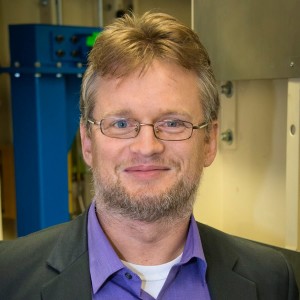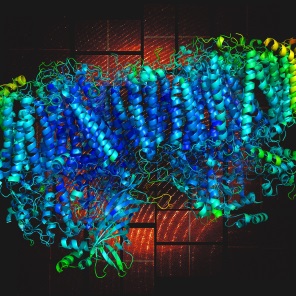Biosciences researchers will contribute their expertise to two new projects funded by DOE to develop cutting-edge research applications for next-generation supercomputers as part of DOE’s Exascale Computing Project (ECP), a component of President Obama’s National Strategic Computing Initiative that intends to maximize the benefits of high-performance computing for U.S. economic competiveness, national security and scientific discovery. ECP announced its first round of funding on September 7 with the selection of 15 application development proposals for full funding and seven proposals for seed funding.
Nicholas Sauter (l), senior staff scientist, and Peter Zwart (r), staff scientist, both in the Molecular Biophsyics & Integrated Bioimaging Division (MBIB), will work with collaborators on “Data Analytics at the Exascale for Free Electron Lasers,” led by SLAC National Accelerator Laboratory. This project was selected for full funding and will receive $10 million over four years to develop computational tools to quickly sift through enormous piles of data produced by powerful X-ray lasers, such as SLAC’s Linac Coherent Light Source (LCLS). The challenge of analyzing such a data volume in a short amount of time will become dramatically harder in the future, as the next-generation LCLS-II X-ray laser will deliver 8,000 times more X-ray pulses per second, resulting in a similar increase in data and data rates.
 As a result of the lasers’ data flood even at today’s levels, researchers collecting data at X-ray lasers presently receive only very limited feedback regarding the quality of their data. “You might only find out days or weeks after your experiment that you should have made certain changes,” explains Zwart, who is also a staff scientist in Berkeley Lab’s Center for Advanced Mathematics for Energy Research Applications (CAMERA), and who will develop computer algorithms for X-ray imaging of single particles. “If we were able to look at our data on the fly, we could often do much better experiments.” The project will also work closely with Los Alamos National Laboratory, ESnet, and NERSC. Read more in the SLAC press release.
As a result of the lasers’ data flood even at today’s levels, researchers collecting data at X-ray lasers presently receive only very limited feedback regarding the quality of their data. “You might only find out days or weeks after your experiment that you should have made certain changes,” explains Zwart, who is also a staff scientist in Berkeley Lab’s Center for Advanced Mathematics for Energy Research Applications (CAMERA), and who will develop computer algorithms for X-ray imaging of single particles. “If we were able to look at our data on the fly, we could often do much better experiments.” The project will also work closely with Los Alamos National Laboratory, ESnet, and NERSC. Read more in the SLAC press release.
In addition, DOE’s Joint Genome Institute, along with Los Alamos National Laboratory, will be supporting “Exascale Solutions for Microbiome Analysis,” one of seven seed projects to be led by Berkeley Lab. The effort received start-up funding over three years; Associate Lab Director Kathy Yelick is project lead. For an overview of all eleven application development proposals selected for funding that involve leadership or key roles by Berkeley Lab researchers, read the Computing Sciences Division news release.





